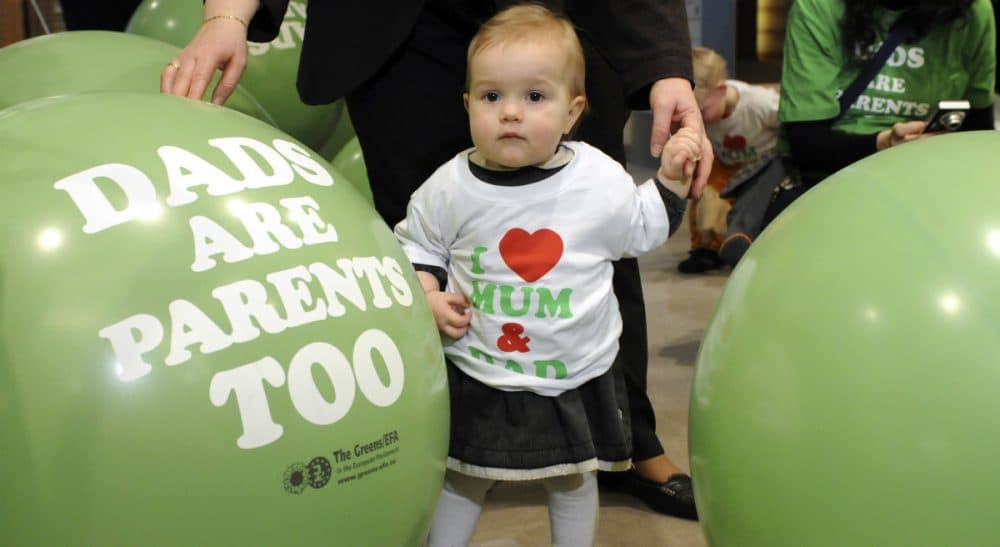Advertisement
Getting Away From The Cult Of Motherhood: Why Paternity Leave Is So Important

Sports radio isn’t a typical venue for impassioned debate on work-family issues and employment policy. But recently when Daniel Murphy took three days off from his job as second baseman for the New York Mets to be with his wife as she delivered their newborn son, it became just that. Two WFAN broadcasters — Mike Francesa and Boomer Esiason — took to the airwaves to rebuke Murphy’s absence.
“Quite frankly, I would have said [to my wife that she should have a] C-section before the season starts,” Esiason said. (For the record: Major League Baseball has had a three-day paternity leave policy since 2011.) Thankfully, all that machismo subsided when fans and athletes came to Murphy’s defense.
“You know, the man had his first child. He's allowed to be there. The rules state that he can be there, so he went,” said Terry Collins, the Mets manager.
Bravo to Murphy for exercising his employee right to take paternity leave. Well done to Collins, his boss, for encouraging him to do so. These are welcome developments, particularly in such a male-dominated arena, like sports.
In a country where paid maternity leave is not even part of our national policy, this little debate — and all the bravado that went with it — may seem like merely a distraction from the bigger issue, but paternity leave is incredibly symbolic. Equity for women in the workplace is never going to happen if there aren’t changes in the family structure, and by that I mean fathers who are active participants in the care of their children.
It’s well known that paternal involvement leads to positive outcomes for children. (Children of highly involved fathers are more likely to enjoy school, participate in extracurricular activities and graduate.) Paternity leave — which gives fathers uninterrupted time to bond with their babies — is a good first step in this direction.

Apparently, this is something that many professional men already appreciate. According to a survey of working fathers conducted in 2011 by the Center for Work and Family at Boston College, over 92 percent of respondents who took time off after the birth of a child reported that it was a positive experience for them. More than three-quarters of the fathers said that they would have liked to have more time off with their new children. This indicates that fathers acknowledge the importance of bonding at the earliest stages of their children’s lives.
From a marriage and work perspective, paternity leave creates a pattern of shared care between two parents right off the bat. It also instills in men a more egalitarian view of household work. A study in the Journal of Applied Developmental Psychology found that fathers who took longer paternity leave generally had higher paternal preoccupation with their babies, had a greater presence in the family and exhibited more marital support. In other words, paternity leave has enormous consequences for a man’s relationship with his wife.
Paternity leave also creates an opportunity for women to stay involved with their careers. My son, who is a professor at a state university where the faculty is unionized, took the contract permitted six weeks leave when his daughter was born. His leave allowed his wife time to finish her PhD and gave him an opportunity to bond with his infant daughter.
When fathers are equal partners at home; women can be equal partners at work.
The benefits of paternity leave extend to organizations, too. Research shows that when men and women leave the workforce for an extended period of time for any reason, they tend to make arrangements for their absence, which in the end turn out to be very effective. They develop the workers underneath them, for instance, which is motivational for those people and also helps with eventual sucession planning. They also often come up with new and different ways of coordinating workloads and communicating with employees that improve efficiency. What’s more, the skills that men and women learn and hone as parents — from delegating to time management to multitasking to negotiating — are useful in the workplace.
We need to get away from the Cult of Motherhood, where mothers are expected to do everything. We need more dads who change diapers, make meals, help with homework and spend time with their kids. The earlier it starts in the life of a child, the better for everyone. When fathers are equal partners at home; women can be equal partners at work.
So kudos to Daniel Murphy and Terry Collins. Let’s the rest of us play ball as well.
Related:
